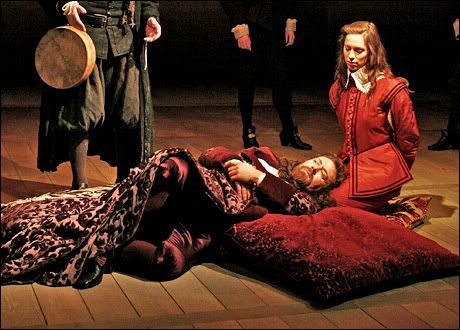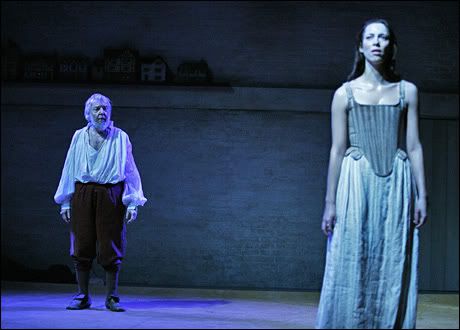THIS WAS A FIRST PREVIEW.
Having beeen interestedly watching everyones reactions to this online all week, it appears I may have been one of the few people to actually have really enjoyed it. Possibly this is because I lack traditional Twelfth Nights, the recent RSC one is about as traditional as I've seen; possibly it's because it's a play I have issues with (more below); possibly it's because I didn't overly like the last production I saw by Filter.
My main problem with the Filter production, was that they had some great ideas but they were obviously so excited by them that if felt to me like the words got completely lost (and to some extent the story, if I hadn't known it already I fear I would have been confused) - and given that Shakespeare's make me somewhat giddy, I was a sad panda. And, I think what won me over so completely with this was how beautiful the verse speaking was. Generally I love Shakespeare done in regional accents (which explains many of my favourites at the RSC) and at speed and as if it's just falling from your tongue naturally (I'm looking at you Mariah Gale) - but that doesn't mean I don't occasionally enjoy the opposite. Here it was languorous and slow with delicate clarity and each world sounded beautiful (though there was the occasional attack of the country bumpkins). It was a joyful thing
Actually langurous is probably a good word to describe the production generally - it reminded me of the slow shift from the heat of summer through to winter - at least partly prompted by the repeating autumn leaf motif throughout the set design. Which was also very pretty, I like leaf motifs in anything - generally it's a very plain set which I felt suited the production and I liked the use of the canopy to create different feels and spaces throughout. I could have done without the houses at the back of the set, however, they sort of worked for the beach scenes but were distracting and innefective for the rest. And the house that appeared during the interval was vaguely nonsensical.
The other thing I liked about this autumnal feel, was that it matched the shift towards darkness at the end. My main, but not only, issue with the play itself is that I can't allign the happy, romanticised love story with what happens to Malvolio. Malvolio is a prat. That at least is fairly undeniable, but it doesn't change the fact that I generally end up liking him or at least pitying him. And whether he is a prat or not, I find what happens to him truly horrific. On top of which, we're then expected to be satisfied by the ending - which has always struck me as odd. Firstly there is Viola and Orsino - though it's clear of Viola's opinion (and Rebecca Hall is utterly love struck - there is forehead stroking :) ), Orsino seems to switch his affections in the play text because Olivia is now married (is the marriage even legal at that point) - meanwhile Olivia has fallen in love with Cesario but married Sebastian, who the play has shown are nothing alike (Sebastian strolls into town, gets into several fights and marries a woman he's never met before using a fake name - also he was shacked up with a gay pirate for months - these are the reasons I love Sebastian. They're also the reason he's nothing like Cesario.) These things do not happy marriages promise. I've always wondered if Shakespeare intended Toby and Mary's hasty union to be a reflection on these other marriages.
This production worked for me in part because I felt acknowledged these problems, it accepted that there was a pessimistic side to this ending mainly through David Ryall's Feste - who I rather loved. He is a melancholy fool and acts throughout as a sort of conscience for the play and for the audience. There's an interesting balance between his private and public persona, between his wisdom and his play of simpleness, and for me the moments where that slipped were fascinating - as our conspirators plotted Malvolio's downfall I couldn't take my eyes from Ryall and having him close the show really worked for me to underline my uneasiness with the ending.
Across the board the performances are routinely good - though perhaps people don't overly shine - there are few standout performances or radical characterisations - though equally no one is bad. I loved Rebecca Hall though, she is somewhat divine and makes an excellently wry Viola. (And making a note here as otherwise I'll forget that Viola is an interesting foil for Rosalind - she is constrained by her manhood where Rosalind is liberated - perhaps that is why I like the latter better). I also enjoyed Simon Paisley Day, Charles Edwards and Samuel James.
It's an odd production when I compare it to the RSC's - element for element I think I mostly preferred the Stratford version, I liked the ideas behind it better (I am somewhat in love with Greg Doran's mind) but that production also had some fairly fatal flaws - this production feels more coherant and overall more successful. It also didn't make me at any point hide behind my programme, this is a good thing.


No comments:
Post a Comment